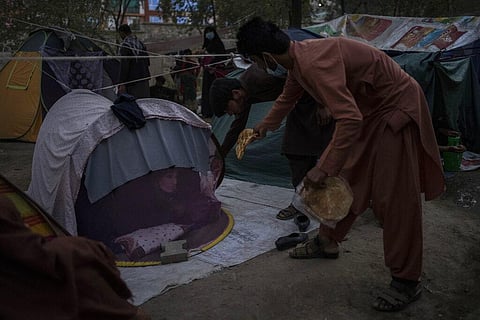

Afghanistan’s Ministry of Foreign Affairs hosted a conference of special representatives and ambassadors of neighbouring and regional countries in Kabul on January 29. The Taliban regime intended to seek the support and cooperation of countries in the region. After centuries of invasions and civil wars, the battered country is in the hands of a regime that is not recognised by any nation of the world. Rather, the ruling dispensation is considered a militant outfit.
Addressing the meeting for ‘Afghanistan’s Regional Cooperation Initiative’, Afghanistan’s Foreign Minister Mawlawi Amir Khan Muttaqi stressed, “The Islamic Emirate of Afghanistan respects others’ interests, choices, government structures, and development models, and in return, expects others to respect Afghanistan’s interests, government, and development choices and models.”
India was among the nations represented in the 'initiative', like China, Russia and Pakistan among others, added a statement from the Afghan Foreign Ministry.
The statement quoted an 'Indian representative' who said, "India actively engages in international and regional initiatives concerning Afghanistan, demonstrating its support for all endeavors aimed at promoting stability and development in Afghanistan."
India’s participation in the meeting is welcome considering the growing Chinese interest in the region. With China’s growing clout, and its support to Pakistan, it is pertinent that a line of dialogue is open with the Taliban regime even if it is not an official recognition.
However, Pakistan – once the training ground and launchpad for Pashtun fighters in Afghanistan – has, of late, fallen out with its neighbour. The main contention is the border in between.
Afghanistan-Pakistan conflict
The Durand Line was created in November 1893 by a British civil servant Sir Mortimer Durand and the then emir of Afghanistan Abdul Rahman Khan to serve as the official boundary between then yet undivided India and Afghanistan. But Afghanistan has since refused to accept it as a border.
Incidentally, a significant number of Pashtuns – who comprise about 60 per cent of Afghanistan’s ethnic population – are settled on the Pakistani side. Kabul wanted the boundary to be shifted eastward – towards the Indus River. The aim was to include the Pashtun-majority areas in Pakistan within its area.
Despite the decades of covert and overt support that Pakistan provided to the Afghan ‘mujahideen’ – comprising mainly Pashtun warriors – with US support, the border remained a bone of contention with several skirmishes taking place intermittently.
Recent squabbling has led to the closure of this border of which Torkham and Spin Boldak are the busiest sections.
Tensions heightened with the Taliban removing the fencing at some points along this border, resulting in Pakistan claiming an increase in terrorist attacks in its areas.
The Torkham border was closed by Pakistan on January 12 over some visa related differences, but was reopened for vehicle traffic 11 days later. However, truckloads of food and relief material are now subject to close scrutiny. As a result, the huge queues of vehicles, stranded during the border closure or in the occasional armed conflicts, are now trickling into Afghanistan.
Afghan traders have been protesting over the issue on both social media and through physical gatherings at the border.
Food crisis
Chair of Afghanistan's Chamber of Commerce Mirwais Hotak recently told the Turkish news agency Anadolu about the huge losses they were suffering while waiting for the vehicles to pass. It includes increase in prices involved in transportation, time loss, penalties for late delivery to buyers, and spoilage of perishable items like fruits and vegetables.
Considering Afghanistan's strategic location connecting Central Asia to South Asia, vehicles carrying commercial goods mostly enter the country, even on their way to other countries as well.
With a population exceeding 40 million, Afghanistan meets a significant portion of its requirements through neighboring countries like Pakistan (south, southeast), Iran (west), Turkmenistan, and Uzbekistan (north).
According to the United Nations' World Food Programme, 15.8 million people in Afghanistan face crisis levels of food insecurity with one in every three Afghans not knowing where their next meal will come from. It estimated that an amount of USD 670 million is urgently needed from January-June 2024 to feed the people.
As Afghanistan sits precariously on the edge of another human disaster, the United Nations will be organising a meeting of all the Afghan envoys from member states and regional organisations in Doha on February 18 and 19. This was confirmed by the Office of the Spokesperson for the Secretary-General on January 26
The collective meetings with the Special Envoys will include Afghan women representatives and civil society representatives.
Flashback
Two years after the Soviet troops’ withdrawal, I stood some kilometres from the border with Pakistan – a line drawn by a British diplomat close to a century earlier. I was escorted by AK-toting Hizb-i-Islami ‘mujahids’ loyal to the then rebel chief Gulbuddin Hekmatyar. It was in the air that their ‘commander’ would return this way on his way to the headquarters at Charasiab – a few kilometres south of Kabul. Despite repeated requests in Urdu by my companions to walk ahead, I preferred to stand where I was.
Several hours passed, a few battered Toyota cruisers went by, but the ‘commander’ didn’t. It was time to drive back to the safer (Hizb-i-Islami) camps. It was two days later that I finally returned to Kabul – unharmed.
That day, while standing near the border, I could never imagine that the two neighbours would be at loggerheads one day.
Neither had I heard of the Taliban then, nor known that a man called Osama bin Laden would be walking there one day, while being hunted by the world for terrorism...
(Jayanta Bhattacharya is an independent journalist. These are the writer's views.)